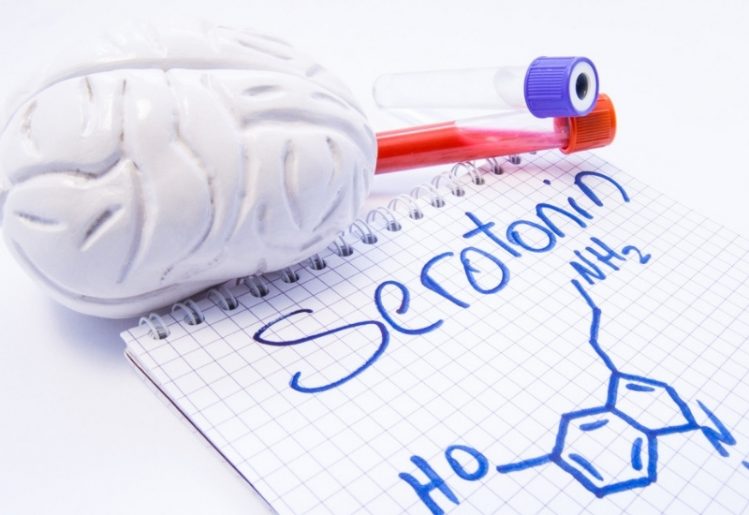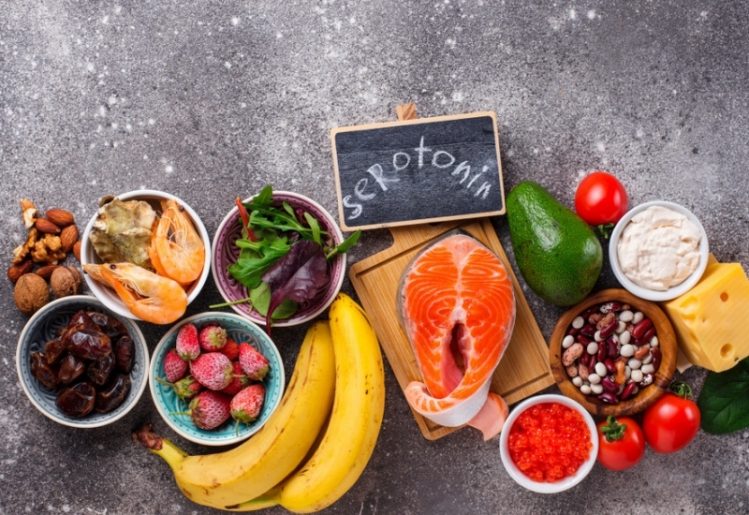Serotonin is a neurotransmitter essential for mood regulation. Produced within the body, this chemical messenger performs a variety of tasks, impacting mood, health and overall well-being in numerous ways. Serotonin levels can dip during the winter months, impacting mood and feelings of well-being. Boosting intake of serotonin in winter can help you to avoid the winter blues.
Causes of Decreased Serotonin in Winter
 People tend to get less sunlight during the winter months. The shorter days leave less opportunity to collect a few rays during the normal course of the daily routine. This can impact both the production and transport of serotonin in the body, due to the impact light has on the function of tryptophan and serotonin.
People tend to get less sunlight during the winter months. The shorter days leave less opportunity to collect a few rays during the normal course of the daily routine. This can impact both the production and transport of serotonin in the body, due to the impact light has on the function of tryptophan and serotonin.
The amino acid tryptophan is a key element in the production of serotonin, both of which are classified as indoleamines; substances whose functions are impacted by light. With the decrease of sunlight that is a natural part of the winter landscape, paying extra attention to maintaining serotonin levels can play an important part in feeling your best during this time of year.
Light also impacts the efficiency of serotonin utilization and transport via the protein responsible for deactivating and recycling serotonin in the brain. Concentrations of this protein have been shown to vary by season.
Cooler temperatures often lead to a reduction of outdoor activities and, for many, decreased physical activity in general. That can be bad for serotonin levels because physical activity helps increase blood levels of the tryptophan necessary for serotonin production.
Serotonin Levels Impact Mood and Well-Being
Many are familiar with the role of serotonin in supporting mood and its potential to help ease symptoms of seasonal and other types of depression. However, that’s not all that serotonin does. In fact, serotonin plays a role in the regulation of a number of physical processes, such as blood clotting. It serves as an important partner in the functioning of the central nervous system and the digestive system. So, while lower serotonin in winter can impact mood, memory and mental health, it can also have a significant impact on physical health and well-being.
Ways to Boost Serotonin Levels During Winter
There are several ways to promote healthy serotonin levels during the winter. Engaging in one or more of these can help to ensure your serotonin levels remain adequate, preserving both mental health and overall well-being through the winter months.
Be More Light-Conscious
With our modern lifestyles, we don’t get the same amount of sunlight our agriculturally focused forefathers did. This is especially true in the winter months. The quality of light we are exposed to has also changed with our shift to artificial light.
Spend at least half an hour outside daily, preferably in the morning sun. Don’t skip the cloudy days, though. Even with cloud cover, there’s still beneficial light to be had. Try to increase natural light use indoors. Use candles and if you have a fireplace, use it. Consider using incandescent or amber-colored bulbs during the winter.
Consume Foods That Aid Serotonin Production
Support serotonin levels via diet by consuming foods rich in tryptophan and by choosing healthy carbohydrates to facilitate the serotonin production process. While turkey may be the most famous tryptophan-rich food, there are plenty of others to choose from. Eggs, tofu, fatty fish, like salmon and tuna, seeds and nuts are all rich in tryptophan. Furthermore, they’re all packed with valuable nutrients that are vital to overall physical health and cognitive function. Despite the best dietary intentions, almost everybody falls short when it comes to obtaining optimum nutrition via the daily diet. Taking a supplement designed to support healthy serotonin production and utilization, like Tryptochron, during the winter months can be helpful.
Chemical reactions are at the heart of most body and brain processes, and the production of serotonin is no different. During the winter, people often crave carbohydrate-heavy comfort foods. These cravings are related to the decrease of serotonin in the body and the important role carbohydrates play in its production.
Carbohydrate consumption sets insulin in motion to clear other amino acids from the bloodstream, leaving tryptophan free to move to the brain to produce serotonin. Choose nutritionally dense carbohydrates, such as whole grains, fresh fruits and vegetables, beans, legumes and nuts. Your body needs certain nutrients to feel your best, especially during winter.
 Reduce Stress and Promote Relaxation
Reduce Stress and Promote Relaxation
Take an active role in feeling good. Reducing stress is important because stress increases levels of the hormone cortisol, which impedes serotonin production. Meditate, get a massage, exercise and try to make adjustments to your daily routine to address the causes of stress in your life.
Try to shift your way of thinking to enjoy more positive thoughts and emotions. Carve out time to socialize with positive, uplifting people. Develop enjoyable, productive hobbies that make you feel accomplished. Be a force for good in your world via volunteer work and helping others. Be deliberately grateful for what you have. Such actions have been shown to help increase serotonin production.
Don’t Let Winter Defeat You
Knowing what the problem is, according to the old adage, is half the battle. However, half a battle isn’t a win. Using what you know is what gets the win. There are a wide range of ways to help boost winter serotonin production and support mood, overall health and well-being. Experiment and find what works best for you. However, balance is essential. Too much serotonin can as disruptive to well-being as too little, so always discuss major changes in health, lifestyle, mood and cognitive function with your health care provider.
 Depending on how serotonin is used by the body, it can act as either a neurotransmitter or a hormone. It works by helping nerve cells communicate with one another and, in this way, allows the brain to regulate mood and emotional health. Serotonin also promotes communication between the brain and the gut in regard to regulating appetite and the digestive process.
Depending on how serotonin is used by the body, it can act as either a neurotransmitter or a hormone. It works by helping nerve cells communicate with one another and, in this way, allows the brain to regulate mood and emotional health. Serotonin also promotes communication between the brain and the gut in regard to regulating appetite and the digestive process. You can help your brain to
You can help your brain to  The temptation to overindulge in holiday treats, such as sweets and foods high in fat and sodium can be hard to resist. However, there is a difference between the occasional indulgence and overindulging. Putting on weight during the holiday season is easy when overindulgence becomes a pattern. Instead, take a mindful approach to holiday eating. Enjoy every bite, but be firmly guided by the principle of moderation. By
The temptation to overindulge in holiday treats, such as sweets and foods high in fat and sodium can be hard to resist. However, there is a difference between the occasional indulgence and overindulging. Putting on weight during the holiday season is easy when overindulgence becomes a pattern. Instead, take a mindful approach to holiday eating. Enjoy every bite, but be firmly guided by the principle of moderation. By  Good nutrition and exercise help alleviate stress in ways that promote health. Meditation is another effective means. Developing concrete skills to target the sources of stress can be highly effective in reducing holiday stress. For example, developing time management skills can help increase productivity and reduce lateness, thereby reducing stress. Learning conflict resolution skills and strategies can help with difficult family situations.
Good nutrition and exercise help alleviate stress in ways that promote health. Meditation is another effective means. Developing concrete skills to target the sources of stress can be highly effective in reducing holiday stress. For example, developing time management skills can help increase productivity and reduce lateness, thereby reducing stress. Learning conflict resolution skills and strategies can help with difficult family situations. Dementia describes a cluster of symptoms that affect cognition, memory and social interaction to the extent that one’s daily life is disrupted. There are
Dementia describes a cluster of symptoms that affect cognition, memory and social interaction to the extent that one’s daily life is disrupted. There are  In addition to nurturing your mind through social connections, you can also stimulate your brain through mental exercises. Research has demonstrated a link between mental exercises and a lower risk of developing Alzheimer’s disease. Good activities to stretch your brain include reading, doing puzzles, playing card games and listening to music.
In addition to nurturing your mind through social connections, you can also stimulate your brain through mental exercises. Research has demonstrated a link between mental exercises and a lower risk of developing Alzheimer’s disease. Good activities to stretch your brain include reading, doing puzzles, playing card games and listening to music.
 Technology can present practical solutions for sharing Thanksgiving in a time of social distancing. Reduce feelings of isolation or loneliness by spending time together via Zoom, perhaps even sharing a holiday meal or dessert together online or getting together after the big meal to chat over coffee. You may even find that, without the usual hustle and bustle of meal prep for a crowd, you actually share more quality time than usual with relatives and friends. Make sure that
Technology can present practical solutions for sharing Thanksgiving in a time of social distancing. Reduce feelings of isolation or loneliness by spending time together via Zoom, perhaps even sharing a holiday meal or dessert together online or getting together after the big meal to chat over coffee. You may even find that, without the usual hustle and bustle of meal prep for a crowd, you actually share more quality time than usual with relatives and friends. Make sure that  In its most basic definition, melatonin is a hormone produced by the body’s pineal gland. The
In its most basic definition, melatonin is a hormone produced by the body’s pineal gland. The  In order to boost production of melatonin in the evening, you need to increase the levels of serotonin in the morning. You can support serotonin production by exposing your body to sunlight in the morning.
In order to boost production of melatonin in the evening, you need to increase the levels of serotonin in the morning. You can support serotonin production by exposing your body to sunlight in the morning.